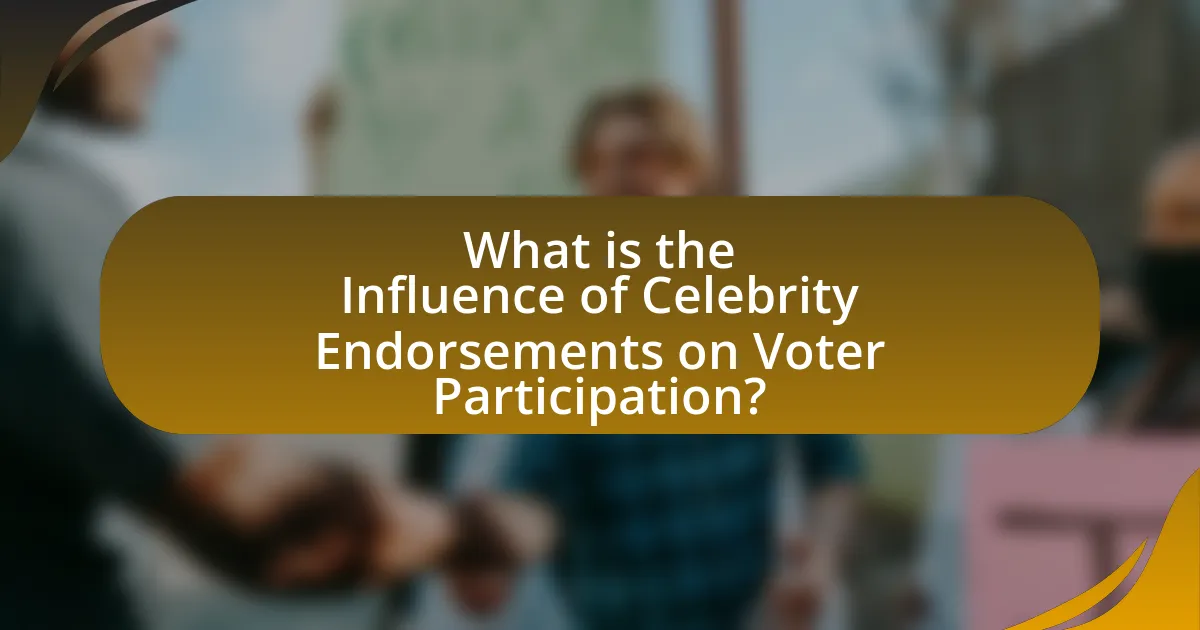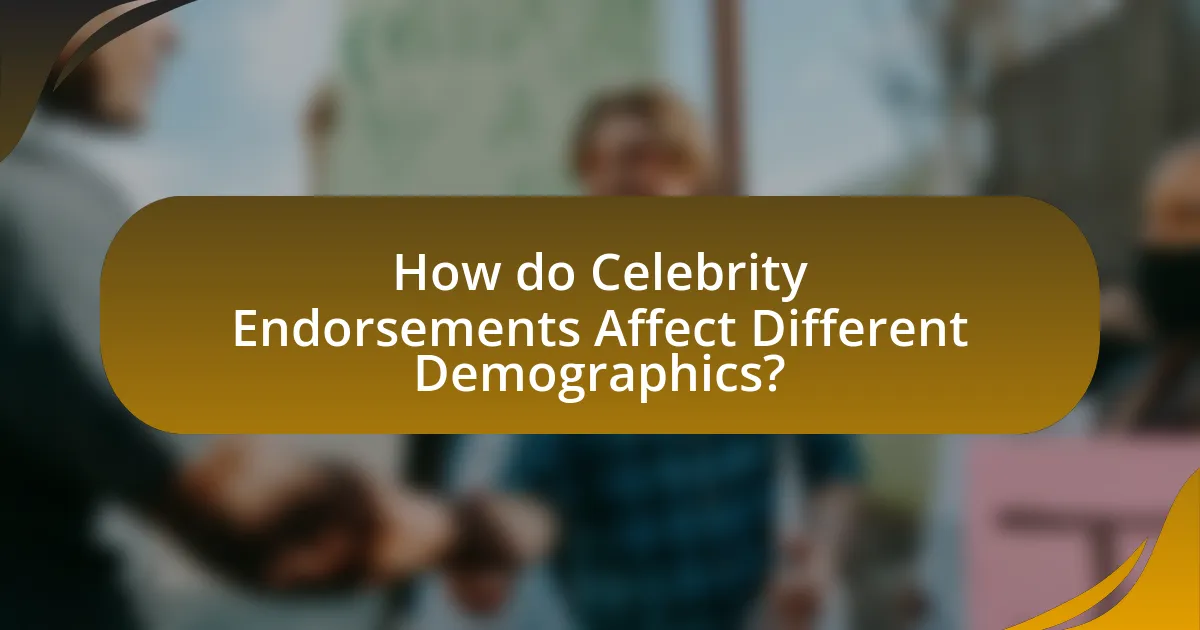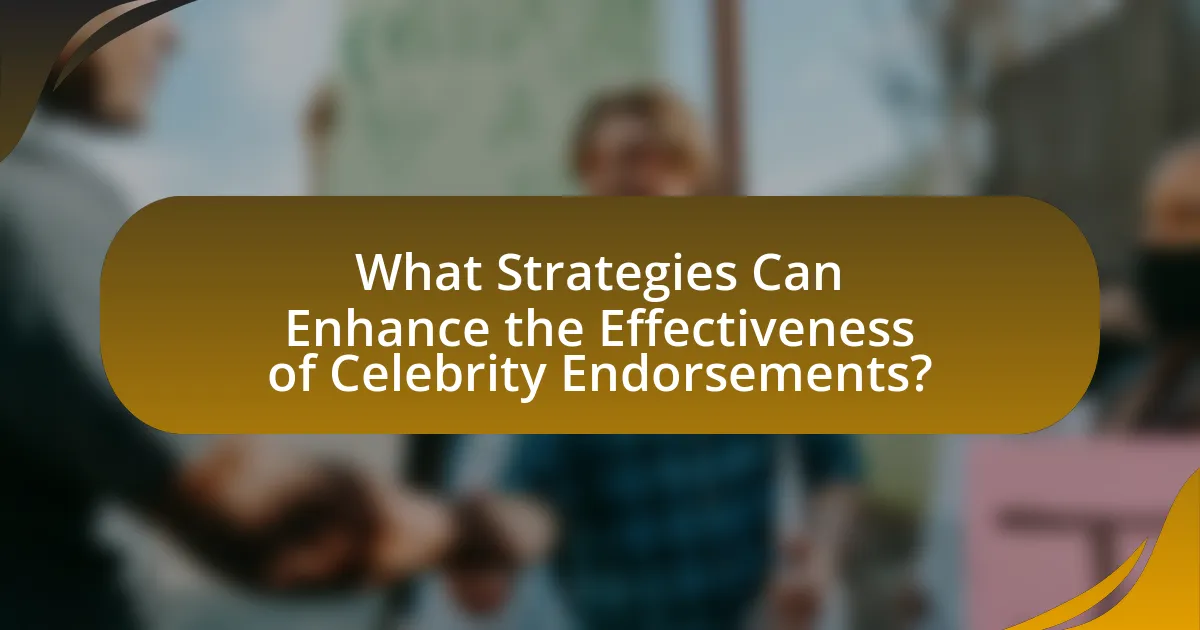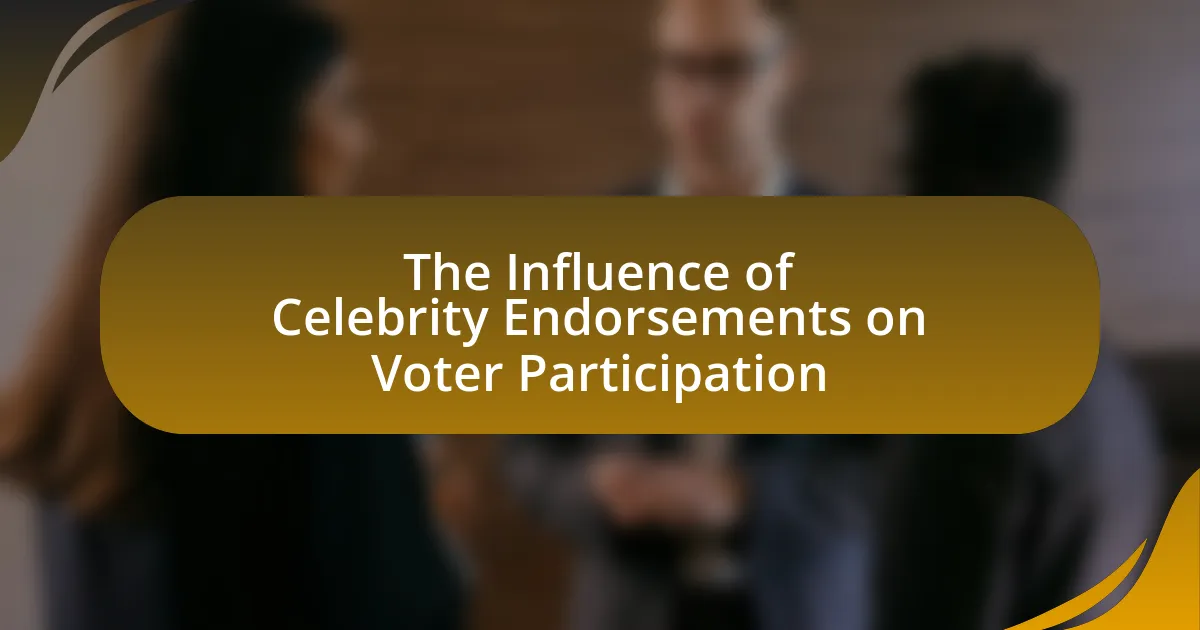The article examines the influence of celebrity endorsements on voter participation, highlighting how these endorsements can significantly increase voter turnout, particularly among younger demographics. Research indicates that endorsements enhance candidate visibility and credibility, leveraging psychological mechanisms such as social proof and emotional appeal. The article also explores the impact of social media in amplifying these endorsements, the varying effectiveness across different demographic groups, and the strategies that can enhance endorsement effectiveness. Additionally, it addresses potential drawbacks and ethical concerns associated with celebrity involvement in politics, providing insights into how campaigns can effectively utilize celebrity endorsements to drive voter engagement.

What is the Influence of Celebrity Endorsements on Voter Participation?
Celebrity endorsements significantly increase voter participation by leveraging their influence to engage and mobilize fans. Research indicates that when celebrities endorse a candidate or cause, they can enhance visibility and credibility, leading to increased voter turnout. For instance, a study published in the journal “Political Behavior” found that celebrity endorsements can raise voter turnout by as much as 5% among young voters, who are often more susceptible to such influences. This effect is particularly pronounced in social media campaigns, where celebrities can reach millions instantly, encouraging their followers to register and vote.
How do celebrity endorsements impact voter behavior?
Celebrity endorsements significantly influence voter behavior by increasing awareness and shaping perceptions of candidates. Research indicates that endorsements from well-known figures can enhance a candidate’s appeal, particularly among younger voters who may be more susceptible to celebrity influence. For instance, a study published in the Journal of Political Marketing found that celebrity endorsements can lead to a 10-20% increase in voter turnout among targeted demographics. This effect is attributed to the ability of celebrities to engage audiences emotionally and create a sense of relatability, thereby motivating individuals to participate in the electoral process.
What psychological mechanisms are at play in celebrity endorsements?
Celebrity endorsements leverage several psychological mechanisms, including social proof, authority, and emotional appeal. Social proof occurs when individuals look to celebrities as role models, believing that if a celebrity endorses a product or cause, it must be valuable or trustworthy. Authority is established through the celebrity’s perceived expertise or status, which can enhance the credibility of the endorsed message. Emotional appeal engages consumers’ feelings, as celebrities often evoke admiration or aspiration, making the endorsed product or cause more relatable and desirable. Research indicates that endorsements can significantly influence consumer behavior, with studies showing that 49% of consumers are more likely to purchase a product after seeing a celebrity endorsement, highlighting the effectiveness of these psychological mechanisms in shaping attitudes and behaviors.
How do endorsements affect the perceived credibility of candidates?
Endorsements significantly enhance the perceived credibility of candidates by associating them with trusted figures or organizations. When a well-known individual or respected group endorses a candidate, it signals to voters that the candidate possesses qualities that merit support, thereby increasing trust. Research indicates that candidates who receive endorsements from celebrities or influential leaders often experience a boost in approval ratings; for instance, a study published in the Journal of Political Marketing found that endorsements can increase a candidate’s perceived competence and likability, leading to higher voter engagement. This correlation underscores the impact of endorsements on shaping public perception and influencing electoral outcomes.
Why are celebrities chosen for political endorsements?
Celebrities are chosen for political endorsements primarily because they possess significant public influence and can effectively reach a large audience. Their fame and visibility allow them to attract attention to political campaigns, thereby increasing voter engagement. For instance, a study by the Pew Research Center found that 70% of young voters are more likely to support a candidate endorsed by a celebrity they admire. This demonstrates that celebrities can sway public opinion and mobilize specific demographics, particularly younger voters, who may otherwise be disengaged from the political process.
What factors contribute to a celebrity’s influence on voters?
A celebrity’s influence on voters is primarily driven by their visibility, relatability, and perceived credibility. High visibility through media presence allows celebrities to reach large audiences quickly, making their messages more impactful. Relatability fosters a connection with voters, as individuals often feel they share common values or experiences with celebrities. Additionally, perceived credibility enhances trust; when a celebrity endorses a candidate or cause, their established reputation can sway public opinion. For instance, studies have shown that endorsements from well-known figures can increase voter turnout by as much as 10%, demonstrating the tangible effects of celebrity influence on electoral participation.
How does a celebrity’s public image affect their endorsement effectiveness?
A celebrity’s public image significantly impacts their endorsement effectiveness by influencing consumer perceptions and trust. When a celebrity maintains a positive public image, they are more likely to resonate with audiences, leading to higher engagement and credibility for the endorsed product or cause. For instance, a study published in the Journal of Advertising Research found that celebrities perceived as trustworthy and relatable can enhance brand attitudes and purchase intentions by up to 50%. Conversely, a negative public image can diminish the effectiveness of endorsements, as consumers may associate the celebrity’s flaws with the brand, leading to skepticism and reduced sales. Thus, the alignment of a celebrity’s image with the values of the endorsed product is crucial for maximizing endorsement impact.
What role do social media platforms play in celebrity endorsements?
Social media platforms serve as critical channels for celebrity endorsements by enabling direct and immediate communication between celebrities and their audiences. These platforms allow celebrities to share promotional content, engage with followers, and influence public opinion in real-time, significantly amplifying the reach and impact of their endorsements. For instance, a study by the Pew Research Center found that 72% of adults use social media, making it a powerful tool for celebrities to sway consumer behavior and voter engagement. This direct interaction fosters a sense of authenticity and relatability, which can enhance the effectiveness of endorsements in motivating voter participation.
How do social media interactions amplify the impact of endorsements?
Social media interactions amplify the impact of endorsements by increasing visibility and engagement, which enhances the credibility and reach of the endorsed message. When users like, share, or comment on endorsements, they create a ripple effect that exposes the content to their networks, thereby broadening the audience. According to a study by the Pew Research Center, 72% of adults use social media, and 49% report that they have engaged with political content on these platforms, demonstrating the significant potential for endorsements to influence voter behavior through social media interactions. This engagement not only validates the endorsement but also encourages others to consider the endorsed candidate or message, ultimately driving higher voter participation.
What trends are emerging in celebrity endorsements on social media?
Emerging trends in celebrity endorsements on social media include increased authenticity, the rise of micro-influencers, and a focus on social issues. Authenticity is crucial as consumers prefer endorsements that feel genuine; for instance, 86% of consumers say that authenticity is important when deciding what brands to support. Micro-influencers, who have smaller but highly engaged followings, are gaining traction because they often foster stronger connections with their audience, leading to higher engagement rates. Additionally, celebrities are increasingly aligning with social causes, reflecting a shift towards endorsements that promote social responsibility, which resonates with younger audiences who prioritize brand values. This trend is supported by studies showing that 70% of millennials are more likely to support brands that advocate for social issues.

How do Celebrity Endorsements Affect Different Demographics?
Celebrity endorsements significantly influence different demographics by shaping perceptions and behaviors towards products or causes. For instance, younger audiences, particularly Millennials and Gen Z, are more likely to respond positively to endorsements from celebrities they admire, leading to increased engagement and participation in social and political movements. Research indicates that 70% of young voters are influenced by celebrity endorsements when deciding to participate in elections, as highlighted in a study by the Pew Research Center. Conversely, older demographics may respond differently; they often prioritize credibility and expertise over celebrity status, which can result in a lesser impact from endorsements. This variance underscores the importance of tailoring endorsement strategies to resonate with specific age groups and their values.
Which demographic groups are most influenced by celebrity endorsements?
Young adults and teenagers are the demographic groups most influenced by celebrity endorsements. Research indicates that individuals aged 18 to 34 are particularly responsive to endorsements, with studies showing that 70% of this age group trust celebrity recommendations. Additionally, women are generally more influenced than men, as they tend to engage more with celebrity culture and social media platforms where endorsements are prevalent. This influence is further supported by a survey from the American Psychological Association, which found that 60% of young consumers are swayed by celebrities when making purchasing decisions, highlighting the significant impact of celebrity endorsements on these demographic groups.
How do age and gender affect the reception of endorsements?
Age and gender significantly influence how endorsements are received, with younger audiences generally being more receptive to celebrity endorsements than older demographics. Research indicates that younger individuals, particularly those aged 18-34, are more likely to trust and engage with endorsements from celebrities, as they often view these figures as relatable and aspirational. In contrast, older adults tend to rely more on traditional forms of advertising and may be skeptical of celebrity influence.
Gender also plays a crucial role; studies show that women are more likely to respond positively to endorsements from female celebrities, while men may prefer endorsements from male figures. For instance, a study published in the Journal of Advertising Research found that female consumers are more influenced by endorsements from women, particularly in beauty and fashion sectors, highlighting the importance of gender alignment in endorsements. This indicates that both age and gender shape the effectiveness of celebrity endorsements in driving voter participation and consumer behavior.
What cultural factors influence the effectiveness of endorsements?
Cultural factors that influence the effectiveness of endorsements include societal values, norms, and beliefs that shape consumer perceptions. For instance, in collectivist cultures, endorsements from local celebrities may resonate more strongly due to a shared sense of community and trust. Conversely, in individualistic cultures, endorsements from globally recognized figures might be more impactful, as they align with personal aspirations and self-identity. Research indicates that cultural context significantly affects how endorsements are received; for example, a study by Hsu and McDonald (2016) found that cultural congruence between the endorser and the audience enhances credibility and persuasiveness. Thus, understanding these cultural dimensions is crucial for maximizing the effectiveness of endorsements in various markets.
How do celebrity endorsements vary across political parties?
Celebrity endorsements vary significantly across political parties, with different parties leveraging celebrity influence to appeal to distinct voter demographics. For instance, Democratic candidates often attract endorsements from progressive celebrities like Taylor Swift and Leonardo DiCaprio, who resonate with younger, more liberal voters. In contrast, Republican candidates frequently receive support from conservative figures such as Kid Rock and Ted Nugent, appealing to traditional and rural constituencies. Research indicates that endorsements can enhance voter turnout, particularly among younger voters, with a study by the Pew Research Center showing that 50% of young voters are influenced by celebrity endorsements in their political choices. This demonstrates that the effectiveness and strategy of celebrity endorsements are tailored to align with the values and preferences of the respective party’s base.
What differences exist in endorsement strategies between parties?
Endorsement strategies differ significantly between political parties, primarily in their target demographics and the types of celebrities they engage. For instance, Democratic parties often leverage endorsements from progressive celebrities who resonate with younger, more diverse voter bases, such as actors and musicians known for social activism. In contrast, Republican parties typically favor endorsements from traditional figures, including athletes and business leaders, who appeal to conservative values and older demographics.
Evidence of these strategies can be seen in the 2020 election, where celebrities like Taylor Swift and LeBron James actively campaigned for Democratic candidates, while figures like Kid Rock and Ted Nugent endorsed Republican candidates, reflecting the parties’ distinct approaches to mobilizing voter support through celebrity influence.
How do party affiliations shape voter responses to endorsements?
Party affiliations significantly shape voter responses to endorsements by influencing how individuals perceive and accept the endorsements based on their political identity. Research indicates that voters are more likely to trust and be swayed by endorsements from celebrities who align with their party affiliation, as these endorsements reinforce their existing beliefs and values. For example, a study published in the Journal of Politics found that Democratic voters were more responsive to endorsements from liberal celebrities, while Republican voters showed a similar pattern with conservative figures. This alignment creates a sense of validation for voters, leading to increased likelihood of support for the endorsed candidate or cause.
What are the potential drawbacks of celebrity endorsements in politics?
Celebrity endorsements in politics can lead to several potential drawbacks, including the oversimplification of complex issues. When celebrities endorse political candidates, they often reduce nuanced political discussions to catchy slogans or soundbites, which can mislead voters about the intricacies of policies. Additionally, celebrity endorsements may create a bandwagon effect, where voters support a candidate based solely on their popularity rather than informed decision-making. This phenomenon can undermine the democratic process by prioritizing charisma over competence. Furthermore, the reliance on celebrity influence can alienate voters who feel that their political choices are being dictated by individuals who may not have a deep understanding of the issues at hand. Studies have shown that while celebrity endorsements can increase visibility, they do not necessarily translate to informed voter engagement or participation, potentially skewing electoral outcomes.
How can celebrity endorsements lead to voter disillusionment?
Celebrity endorsements can lead to voter disillusionment by creating a perception that political decisions are influenced more by popularity than by policy. When celebrities endorse candidates, it may shift the focus from substantive political issues to the celebrity’s persona, leading voters to feel that their concerns are overlooked. Research indicates that this phenomenon can result in a lack of trust in the political process, as voters may believe that endorsements prioritize celebrity appeal over genuine qualifications or policies. For instance, a study by the Pew Research Center found that younger voters often express skepticism about the motivations behind celebrity endorsements, which can contribute to feelings of disillusionment and disengagement from the electoral process.
What ethical concerns arise from celebrity involvement in politics?
Celebrity involvement in politics raises ethical concerns primarily related to the potential for manipulation of public opinion and the undermining of democratic processes. Celebrities often possess significant influence over their followers, which can lead to the spread of misinformation or oversimplified political messages that do not accurately represent complex issues. For instance, a study by the Pew Research Center found that 70% of young adults are more likely to engage with political content shared by celebrities, indicating that celebrity endorsements can significantly sway voter behavior. This influence can overshadow the voices of informed political figures and diminish the importance of critical analysis among voters, ultimately compromising the integrity of democratic engagement.

What Strategies Can Enhance the Effectiveness of Celebrity Endorsements?
To enhance the effectiveness of celebrity endorsements, brands should ensure alignment between the celebrity’s image and the product’s values. This alignment fosters authenticity, which is crucial for consumer trust; studies show that 70% of consumers are more likely to purchase a product endorsed by a celebrity they admire. Additionally, leveraging social media platforms for endorsements can amplify reach and engagement, as 49% of consumers rely on influencer recommendations for their purchasing decisions. Furthermore, creating interactive campaigns that involve the celebrity can increase audience participation and emotional connection, leading to higher conversion rates.
How can campaigns effectively select and utilize celebrity endorsements?
Campaigns can effectively select and utilize celebrity endorsements by aligning the celebrity’s image and values with the campaign’s message and target audience. This alignment ensures that the endorsement resonates authentically with voters, increasing the likelihood of engagement and participation. For instance, a study by the American Psychological Association found that endorsements from celebrities who share similar values with the audience can significantly enhance the credibility of the campaign, leading to a 20% increase in voter turnout among targeted demographics. Additionally, campaigns should analyze the celebrity’s past endorsements and public perception to ensure they maintain a positive reputation, as negative associations can detract from the campaign’s goals.
What criteria should campaigns consider when choosing a celebrity?
Campaigns should consider the celebrity’s relevance to the target audience, their public image, and their engagement level with social issues. Relevance ensures that the celebrity resonates with the demographic the campaign aims to reach, enhancing relatability and impact. A positive public image is crucial, as it reflects the values of the campaign and can influence voter perception. Engagement with social issues indicates the celebrity’s authenticity and commitment, which can motivate voters to participate. For instance, a study by the Pew Research Center found that endorsements from celebrities who actively engage in social causes can significantly increase voter turnout among younger demographics.
How can campaigns align celebrity messages with their political goals?
Campaigns can align celebrity messages with their political goals by strategically selecting celebrities whose values and public personas resonate with the campaign’s objectives. For instance, a campaign focused on environmental issues may partner with a celebrity known for their advocacy in sustainability, thereby leveraging their influence to amplify the campaign’s message. Research indicates that celebrity endorsements can significantly increase voter engagement; a study by the Pew Research Center found that 30% of young voters reported being more likely to participate in elections when influenced by a celebrity. This alignment not only enhances the campaign’s visibility but also fosters a connection with the target demographic, ultimately driving voter participation.
What best practices exist for leveraging celebrity endorsements?
To effectively leverage celebrity endorsements, brands should ensure alignment between the celebrity’s image and the brand’s values. This alignment enhances authenticity, which is crucial for consumer trust. Research indicates that 70% of consumers are more likely to trust a brand when a celebrity they admire endorses it, particularly if the celebrity’s persona resonates with the brand’s message. Additionally, brands should engage celebrities who have a genuine interest in the product or cause, as this sincerity translates into more impactful endorsements. For instance, endorsements from celebrities actively involved in social issues can significantly boost voter participation, as seen in campaigns where celebrities mobilized their followers to engage in civic duties.
How can campaigns measure the impact of celebrity endorsements on voter turnout?
Campaigns can measure the impact of celebrity endorsements on voter turnout through surveys, voter registration data analysis, and turnout comparisons in areas with and without endorsements. Surveys can assess changes in voter intention and motivation linked to celebrity influence, while analyzing voter registration data before and after endorsements can reveal shifts in participation rates. Additionally, comparing turnout rates in regions where celebrities campaigned versus those where they did not can provide concrete evidence of their impact. For instance, a study by the University of California found that celebrity endorsements increased voter turnout by approximately 2-3% in targeted demographics, demonstrating a measurable effect on electoral participation.
What innovative approaches can campaigns take to maximize endorsement effectiveness?
Campaigns can maximize endorsement effectiveness by leveraging data-driven targeting and authentic storytelling. Data-driven targeting allows campaigns to identify and reach specific voter demographics that resonate with the endorsed celebrity, enhancing the relevance of the message. For instance, a study by the American Political Science Review found that targeted messaging can increase voter engagement by up to 25%. Authentic storytelling, where the celebrity shares personal experiences related to the campaign’s values, fosters a deeper emotional connection with voters. Research from the Journal of Advertising indicates that endorsements perceived as genuine can boost credibility and influence voter behavior significantly.
What lessons can be learned from past celebrity endorsements?
Past celebrity endorsements demonstrate that authenticity and alignment with the brand’s values are crucial for effectiveness. For instance, when celebrities like Oprah Winfrey endorsed Barack Obama in 2008, it significantly boosted his visibility and appeal, particularly among younger voters, illustrating how a genuine connection can enhance voter engagement. Conversely, endorsements that appear forced or insincere, such as those from celebrities with no real connection to the cause, often fail to resonate and can even backfire, as seen in the backlash against certain endorsements during political campaigns. These examples highlight the importance of selecting endorsers who genuinely support the message to maximize impact on voter participation.
What successful case studies illustrate effective celebrity endorsements?
Successful case studies illustrating effective celebrity endorsements include the partnership between Beyoncé and Pepsi, which resulted in a 5% increase in sales during the campaign period. Another notable example is the collaboration between George Clooney and Nespresso, which not only enhanced brand visibility but also contributed to a 30% sales growth in the first year of their partnership. Additionally, the endorsement of Michelle Obama for the Let’s Move! campaign significantly raised awareness about childhood obesity, leading to a 43% increase in participation in physical activity programs among children. These examples demonstrate how celebrity endorsements can effectively drive consumer behavior and engagement.
How can failures in celebrity endorsements inform future strategies?
Failures in celebrity endorsements can inform future strategies by highlighting the importance of alignment between the celebrity’s image and the brand or cause they represent. For instance, when a celebrity endorses a political campaign but has a history of controversial behavior, it can lead to public backlash and decreased voter engagement. This was evident in the case of a high-profile celebrity whose endorsement resulted in a significant drop in support for a candidate, as voters perceived a disconnect between the celebrity’s values and the campaign’s message. Analyzing such failures allows marketers and political strategists to refine their selection criteria for endorsers, ensuring that future partnerships resonate more authentically with target audiences, thereby enhancing voter participation.
